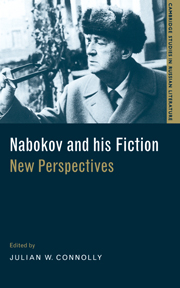Book contents
- Frontmatter
- Contents
- A note on the contributors
- A note on transliteration
- A note on abbreviations
- Acknowledgments
- Introduction: Nabokov at 100
- PART 1 ARTISTIC STRATEGIES AND THEMES
- 1 Setting his myriad faces in his text: Nabokov's authorial presence revisited
- 2 Vladimir Nabokov and the art of autobiography
- 3 The near-tyranny of the author: Pale Fire
- 4 Jewish questions in Nabokov's art and life
- 5 “The dead are good mixers”: Nabokov's versions of individualism
- 6 Nabokov's trinity (On the movement of Nabokov's themes)
- PART 2 LITERARY AND CULTURAL CONTEXTS
- Selected bibliography
- Index
- CAMBRIDGE STUDIES IN RUSSIAN LITERATURE
6 - Nabokov's trinity (On the movement of Nabokov's themes)
Published online by Cambridge University Press: 18 December 2009
- Frontmatter
- Contents
- A note on the contributors
- A note on transliteration
- A note on abbreviations
- Acknowledgments
- Introduction: Nabokov at 100
- PART 1 ARTISTIC STRATEGIES AND THEMES
- 1 Setting his myriad faces in his text: Nabokov's authorial presence revisited
- 2 Vladimir Nabokov and the art of autobiography
- 3 The near-tyranny of the author: Pale Fire
- 4 Jewish questions in Nabokov's art and life
- 5 “The dead are good mixers”: Nabokov's versions of individualism
- 6 Nabokov's trinity (On the movement of Nabokov's themes)
- PART 2 LITERARY AND CULTURAL CONTEXTS
- Selected bibliography
- Index
- CAMBRIDGE STUDIES IN RUSSIAN LITERATURE
Summary
We give to Space an image, and to Time
Our recollection, and to Matter – love.
Dandeliothe theme
What single aspect makes Nabokov's polyhedral fiction so extraordinary? After all, few practiced readers will not agree with Martin Amis that Nabokov does “all the usual things” – creates characters, threads storyline, writes prose – “better than anybody else.”
The most striking difference between a casual reader of his writings, even an intelligent one experienced in good reading, and a seasoned student of Nabokov who has traversed his books many times, is that fine shades of meaning may escape the former, since it takes many successive readings of a Nabokov text to discover and then study higher planes of narrative strategies. Depending on the student's (the notorious Nabokovian “re-reader's”) individual talents and experience, he will sooner or later make out the subtle recurrence of images and situations which weave, at a proper remove from the scene of action, thematic grids. The intricately beautiful meaning and function of these patterns – along with their aesthetic and even metaphysical implications – cut the most distinctive facet of Nabokov's work.
This essay considers the general subject of Nabokov's themes, in an attempt to single out and arrange several larger strains in them. In the last section, I take up the example of one of his earliest works, only recently published, to show that those strains were formed astonishingly early and ran a surprisingly long and stable course.
Before going any further, I should define the volume of meaning associated with the term theme inasmuch as it can be applied to Nabokov.
- Type
- Chapter
- Information
- Nabokov and his FictionNew Perspectives, pp. 109 - 138Publisher: Cambridge University PressPrint publication year: 1999
- 1
- Cited by

